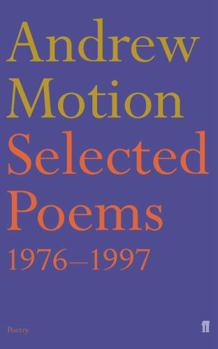Andrew Motion Selected Poems, 1976-1997
Select Format
Select Condition 
Book Overview
In this book Andrew Motion has made his own choice from his outstandingly fine and varied body of work. Dramatic monologues, elegies, poems of social and political observation, love lyrics - all are... This description may be from another edition of this product.
Format:Paperback
Language:English
ISBN:0571195040
ISBN13:9780571195046
Release Date:January 1999
Publisher:Faber & Faber
Length:151 Pages
Weight:0.44 lbs.
Dimensions:0.6" x 5.0" x 7.8"
Related Subjects
PoetryCustomer Reviews
1 rating
Beneath the Ice
Published by Thriftbooks.com User , 21 years ago
The convincing emotion in this selection of poems is grief and Motion's unending quarrel with his mother's early death is the pulse of his career. The opening poem wanders in a present life but closes inexorably in the past, with his father's hand pushing back hair from a hospital bed-ridden mother's "desperate face" and "the way love looks, its harrowing clarity."It is not clear what did for her, "A Blow to the Head" one long mid-career sequence calls it, but the emotional shut-down of the mother, her eyes that "refuse to recognise..and turn away", leave a residue in all the things Motion considers and it is grief where he finds full throated voice. There are syntactical, grammatical infelicities in the earlier poems - "the more I think back to your house/I grew up in" - which jarrs and the poems have been revised for this volume and such blips are absent from later poems so I wonder why these are still here. But grief, even in the guise of another person's feelings, another person's excuses for grief, spills most strongly from the poems, even if it's grief for an animal which suddenly arises, compassion disguised as a social comedy in the late poem "The Spoilt Child" and its abandoned, wounded dog. And it is grief which Motion becomes more articulate, more debonaire in handling over the course of these books, grief, which is the cost of things.Dramatic monologues and historical pastiches are a strong suit - these miniature novels often cram the sketch of a whole life consummately into a page or five. But the theme's the same: in "Independence" the long saga of a career and courtship in the Punjab and its aftermath only becomes more than history book clippings when the character loses and mourns his wife: "collapsing dresses into tea chests,/scooping up the baby things, /your belts, a thrown-down petticoat... So much of you to find!" Which story ends with the Motion speaker's usual emotional pitch when not spurred into mournful song: "Sun is no more/than a white, widening slit. The sea/ a blank horizon returning to grey."There is great temptation with the biographer of Larkin, let alone another Laureate-in-waiting, to compare his work with that master's - but only here and there does he strike a Larkinesque attitude - very successfuly. The poem "Hull" acknowledges Larkin before the speaker, at the end of the affair, looks out of the flat of his soon to be abandoned lover at the plant house below where strangers "nod to each other through floppy-tongued leaves" and a minah bird will say nothing "except- if you scare him badly enough - his name." The little humour piece "It is an Offence" discusses the defecation of the neighbour's whippet ("surprisingly slow for a whippet") with similarly Larkinesque clipped moans. But it is the two animal stories I like best - "The Dancing Hippo" where Motion ably ventriloquises a circus manager and the trainer of a hippo who after learning to dance ("that we thought nothing/but seemed to them a miracle") is bu





